Phyllis: Spring is finally here, and the pollinators are buzzing in the blossoms, so we thought we’d write about bugs this month. Plus, we’ve just finished a book with our good friend and fellow writer Liza Ketchum about the rusty-patched bumblebee, the first bumblebee to be listed as endangered. Once we started looking for buggy books, we found so many by Eric Carle, from very hungry caterpillars to very grouchy ladybugs to very lonely fireflies that we decided to look at his body of work.
Since A Very Hungry Caterpillar was published in 1969 (his original idea was A Week With Willi Worm, but his editor suggested a caterpillar as a more sympathetic character), Carle has published more than 70 picture books that have sold more than 150 million copies around the world. In addition, he and his late wife Bobbie established the Eric Carle Museum of Picture Book Art in 2002.
Here are a few of our favorites:
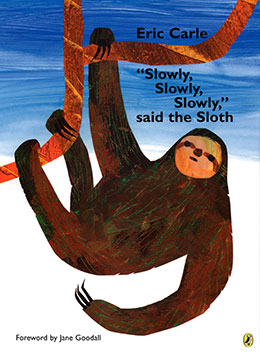 In “Slowly, Slowy Slowly,” said the Sloth the sloth slowly, slowly, slowly crawls along a tree branch, eats a leaf, falls asleep, wakes up. All day, all night, even in the rain the sloth hangs upside down in a tree. The other animals ask the sloth, Why are you so slow? So quiet? So boring? The sloth doesn’t answer until the jaguar asks (rather rudely), “Why are you so lazy?” Then the sloth thinks for a long, long, long time and says, “It is true that I am slow, quiet, and boring. I am lackadaisical, I dawdle, and I dilly-dally. I am also unflappable, languid, stoic, impassive, sluggish, lethargic, passive, calm, mellow, laid-back, and, well, slothful. I am relaxed and tranquil, and I like to live in peace. But I am not lazy … That’s just how I am. I like to do things slowly, slowly, slowly.”
In “Slowly, Slowy Slowly,” said the Sloth the sloth slowly, slowly, slowly crawls along a tree branch, eats a leaf, falls asleep, wakes up. All day, all night, even in the rain the sloth hangs upside down in a tree. The other animals ask the sloth, Why are you so slow? So quiet? So boring? The sloth doesn’t answer until the jaguar asks (rather rudely), “Why are you so lazy?” Then the sloth thinks for a long, long, long time and says, “It is true that I am slow, quiet, and boring. I am lackadaisical, I dawdle, and I dilly-dally. I am also unflappable, languid, stoic, impassive, sluggish, lethargic, passive, calm, mellow, laid-back, and, well, slothful. I am relaxed and tranquil, and I like to live in peace. But I am not lazy … That’s just how I am. I like to do things slowly, slowly, slowly.”
What a wonderful panoply of words to fall back on when I am feeling slow, which seems more and more often in this time of Covid-19. The sloth moves at sloth speed, and I, too, I can be unflappable, languid, calm, mellow — but never lazy.
Carle’s website states, “Besides being beautiful and entertaining, his books always offer the child the opportunity to learn something about the world around them.” Although the text doesn’t mention it, the sloth is the world’s slowest mammal, so slow that algae grows on its fur, and Carle’s sloth’s fur has a definite and accurate green tinge to it. (I once did a ninth grade report on the growth of algae on the three-toed sloth, so Carle’s algaed sloth makes me especially happy.)
Jackie: I agree those words should be added to all of our lexicons. I’m imagining waking up and saying, “Today I feel unflappable, languid, and mellow.” And it seems that might make for a good day. It’s so satisfying that the sloth is happy with just who he is. He doesn’t worry about those who are faster or more goal driven. He’s good with his essential sloth-ness.
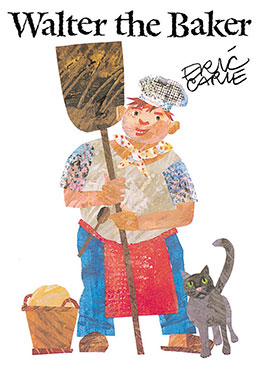 I have an Eric Carle baking book to share. Walter the Baker was published in 1972 and was off my radar, but it’s a charming story about a skilled and clever baker, Walter, who was “the best baker in the whole duchy.” The Duke and Duchess loved his sweet rolls and ate them every morning. And then, oh my gosh, Walter’s cat spilled the milk Walter was planning to use in the sweet rolls, so he had to make his rolls with water. The Duke and Duchess could tell something was wrong and decided to expel Walter from the Duchy. Walter asks for one last chance and the Duke agrees, but only if Walter can invent a roll “through which the rising sun can shine three times.” The roll must be made of one piece of dough and must taste good. AND it must be done by tomorrow morning.
I have an Eric Carle baking book to share. Walter the Baker was published in 1972 and was off my radar, but it’s a charming story about a skilled and clever baker, Walter, who was “the best baker in the whole duchy.” The Duke and Duchess loved his sweet rolls and ate them every morning. And then, oh my gosh, Walter’s cat spilled the milk Walter was planning to use in the sweet rolls, so he had to make his rolls with water. The Duke and Duchess could tell something was wrong and decided to expel Walter from the Duchy. Walter asks for one last chance and the Duke agrees, but only if Walter can invent a roll “through which the rising sun can shine three times.” The roll must be made of one piece of dough and must taste good. AND it must be done by tomorrow morning.
Walter goes home and makes dough after dough. He’s ready to give up and throws a long piece of dough up to the ceiling. It twists its way down and twists itself into a pretzel shape with three opening for the rising sun to shine through. Walter has done it! The Duke and Duchess are pleased. And Walter makes pretzels for the whole town. This story makes me want to make pretzels. If it does the same you, there are many recipes online. Here’s just one.
Phyllis: I’m so happy Walter invented pretzels, which I love. I love, too, the recognition that sometimes it’s just when we are ready to give up that we stumble upon a solution, an acknowledgement both of the power of persistence and also of serendipity.
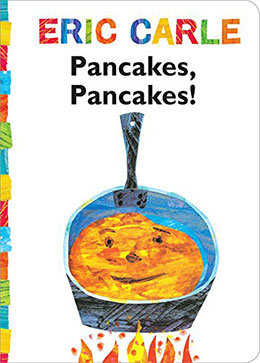 While we’re on the topic of food, in Pancakes, Pancakes! Jack wakes up wanting a big pancake for breakfast. His busy mother says he will have to help. She sends him with a sickle to cut as much wheat as a donkey can carry to take to the miller to grind into flour. At the mill Jack first needs to help thresh the wheat with a flail, and the miller grinds the resulting grain into flour. “Here’s the flour,” Jack tells his mother. “Let’s make a pancake.”
While we’re on the topic of food, in Pancakes, Pancakes! Jack wakes up wanting a big pancake for breakfast. His busy mother says he will have to help. She sends him with a sickle to cut as much wheat as a donkey can carry to take to the miller to grind into flour. At the mill Jack first needs to help thresh the wheat with a flail, and the miller grinds the resulting grain into flour. “Here’s the flour,” Jack tells his mother. “Let’s make a pancake.”
“Now we need an egg,” his mother tells him and sends him to get an egg from the black hen.
“Here’s an egg,” Jack says. “Let’s make a pancake.”
“Now we need some milk,” she replies.
After each completed task, Jack says, “Let’s make a pancake,” but the next task awaits.
The milk must be churned into butter, he must gather firewood for the fire and bring up some strawberry jam from the cellar. At last they are ready to mix the batter: flour, egg, milk in a bowl, stirred smooth. The batter cooks on one side, then Jack’s mother deftly flips it, cooks the other side, and spreads strawberry jam on the pancake.
“Now, Jack,” she begins.
“Oh, mother, “ says Jack, “I know what to do now.” And he does, as he happily forks a bite of pancake into his mouth.
Talk about delayed gratification and all the often-unseen steps involved in making the food we eat! A simple pancake recipe — flour and egg and milk — is included. I plan to try it immediately — the more I read this book, the more ravenous I became.
Jackie: The rooster that begins this book is just arrestingly beautiful. It promises a good time, a reading adventure.
And, I really enjoyed Carle’s introduction of new processes and new words. The wheat grains must be separated from the chaff. The miller and Jack use flails. What a great word for kids to know about. As you said, Phyllis, his books always offer kids an opportunity to learn something.
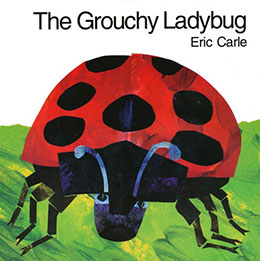 The Grouchy Ladybug doesn’t flail about, but does have a rough day, as anyone who’s ever been grouchy will recognize. And these days my mood often swings between grouchy and grateful, so I was pleased to spend time with this ladybug, who is just grouchy, no reason, maybe just woke up grouchy.
The Grouchy Ladybug doesn’t flail about, but does have a rough day, as anyone who’s ever been grouchy will recognize. And these days my mood often swings between grouchy and grateful, so I was pleased to spend time with this ladybug, who is just grouchy, no reason, maybe just woke up grouchy.
In any case her response to the friendly ladybug she meets on a leaf is “Do you want to fight?” Then the grouchy ladybug decides “You’re not big enough,” and she goes off searching for just the right sparring partner. Yellow-jacket, Stag Beetle, Praying Mantis, Sparrow, Lobster (Eric Carle’s lobster is too beautiful to eat), Skunk, and larger animals up to a whale are among Ladybug’s encounters. All have threatening features so all are deemed not big enough to fight. Ladybug gets no reply from Whale so threatens its flipper, fin, and tail. The tail responds with a smack and the Ladybug is shot “across the sea and across the land.” At six in the evening it arrives where it had started, “wet, and tired, and hungry,” and grateful for a share of the aphids. The two ladybugs eat all the aphids and fall asleep together as the sun goes down and beautiful Eric Carle fireflies come out under the smiling moon.
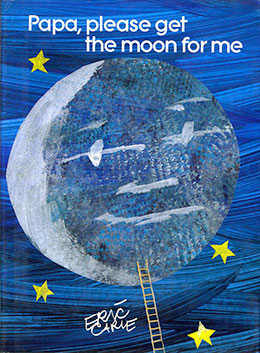 Phyllis: Yes, the moon. In Papa, please get the moon for me, when Monica wants to play with the round, full moon, who looks just the right size for a playmate high in the sky, she cannot reach it no matter how much she stretches. So she asks her papa, who gets a very long ladder, so long that both pages of the double page spread must open up to the sides to show a ladder four pages wide. On the next spread, the page unfolds from the top to make a very tall ladder on the very high mountain where Papa places it. Papa climbs up, up, up to the moon, which unfolds pop-up-like beyond the edges of the page to immense size, so heavy Papa cannot budge it. The moon tells Monica’s papa that he gets a little smaller each night, until he will be the right size to take to play with Monica. And the moon does shrink each night until, when it is just the right size, Papa takes it and climbs down, down, down the ladder that now unfolds from the bottom of the page. Monica jumps and dances and plays with the moon, which gets smaller and smaller until it disappears. A few nights later, Monica sees a thin sliver of moon in the sky, which grows and grows and grows back into its full round self shining in through Monica’s window. All is well in the world of loving papa, lucky child, and accommodating moon.
Phyllis: Yes, the moon. In Papa, please get the moon for me, when Monica wants to play with the round, full moon, who looks just the right size for a playmate high in the sky, she cannot reach it no matter how much she stretches. So she asks her papa, who gets a very long ladder, so long that both pages of the double page spread must open up to the sides to show a ladder four pages wide. On the next spread, the page unfolds from the top to make a very tall ladder on the very high mountain where Papa places it. Papa climbs up, up, up to the moon, which unfolds pop-up-like beyond the edges of the page to immense size, so heavy Papa cannot budge it. The moon tells Monica’s papa that he gets a little smaller each night, until he will be the right size to take to play with Monica. And the moon does shrink each night until, when it is just the right size, Papa takes it and climbs down, down, down the ladder that now unfolds from the bottom of the page. Monica jumps and dances and plays with the moon, which gets smaller and smaller until it disappears. A few nights later, Monica sees a thin sliver of moon in the sky, which grows and grows and grows back into its full round self shining in through Monica’s window. All is well in the world of loving papa, lucky child, and accommodating moon.
Jackie: No matter what the story, all is well at the end. The grouchy are grateful, the hungry have pancakes, the moon smiles down from the sky, the sloth has made his statement, the baker is reinstated. These are rewarding books for hard times. They remind us to find little pockets where all is right — our gardens, our mixing bowls, the warm yellow sun, the moon, wonderful stories with beautiful illustrations.
Phyllis: And good friends to write blogs with.
